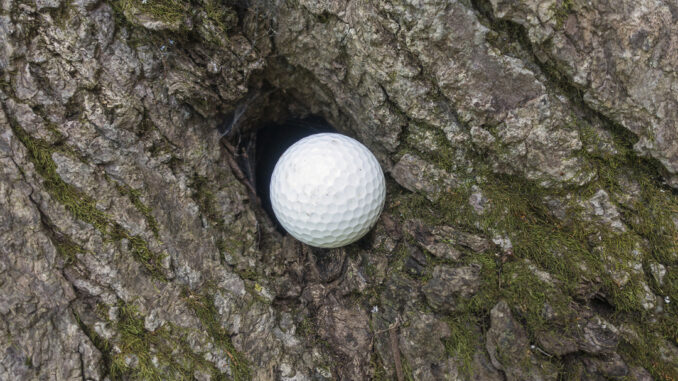
“The weep for simplification of the Rules of Golf is a stock-in-trade of the journalist during the winter months. Countless words on the subject have been poured out to an ever-tolerant public, but still the long-sought simplification does not come.” – Henry Longhurst
Reading the above words which the famed British golf writer penned more than 75 years ago made me realize that the age-old adage is correct: the more things change, the more they stay the same. As much as we talk about simplifying – or decluttering our lives – humans always find ways to make things more complicated; this, despite the promises that technology was supposed to make our lives easier and make us more efficient in our everyday tasks.
As Longhurst specifically wrote in reference to the Rules of Golf, we love to talk about ways to simplify, but the “long-sought simplification” rarely comes. I saw this play out daily in my years working for a pair of government agencies. Committees were struck. Consultants were hired. All with the goal of arriving at new and easier ways to streamline tasks and make these organizations more efficient. Despite this societal longing for an easier way, when it comes to the simple life, we often fail.
In researching stories for my next book (more on that in a future column), I was surprised to learn that several sources, including the United States Golf Association, claim that the informal noun “mulligan” – in reference to golf – means a redo or second chance to replay an errant stroke and is named after a Canadian. David Mulligan, a Montreal hotel magnate, apparently re-teed his ball one morning at his local course, calling it a “correction shot”; his playing partners dubbed it a mulligan in his honour and the tradition and moniker stuck.
I’ve always enjoyed taking a couple of mulligans during a round (as long as my playing partners agree and if I’m not keeping an official score), so learning that one of our own invented this do-over added to my view that despite it not being an official rule of golf, the mulligan is ok by me.
Thinking about mulligans got me ruminating about perfection. Our quest as humans, not just in golf but also in life, is to constantly improve. We often look at the flaws of others as weaknesses or character traits which they need to correct, when possibly these perceived defects are inherent strengths?
Do not get me wrong. To improve is a worthy goal. If we are content in our jobs or in any other pursuits, if we don’t look at ways to improve and simply remain the same, we can become stagnant. Sometimes, from this state, laziness and ennui ensue. Continuous improvement drives athletics, industry, science and all facets of our lives. But is constant improvement always healthy and for the greater good? Does it sometimes come at a cost? If my focus on improvement overshadows my enjoyment, then that is when I believe it to be a detriment rather than a positive.
As a recreational player who is lucky to get a dozen rounds in each season, if I’m not practising between playing, then how can I improve anyway? My point: do not let your desire to improve or your constant comparing – either to your playing partners or to your younger self – detract from simply enjoying this great game.
Along with this constant need to get better comes another negative: settling only for perfection and/or constantly comparing yourself to others, instead of enjoying the pastime. I was reminded of this notion of the raison d’être behind why we do some of the things that we do the other day when my father compared a workout which he had just completed on the Peloton bike with the same workout that I had completed a few days earlier. He told me that his metrics were better than mine for this particular ride. Did I care? No. As I told him, working out, for me, is about the act, about sweating and getting my endorphins going. The fact that I’m sitting in the saddle and exercising rather than sitting in a chair – with the goal of enhancing my physical and mental health – that is what matters most.
The same holds true for golf. If you regularly read my column, you know that I seldom keep my golf score. For me, when it comes to a round of golf, the score is secondary to the experience. So why not take that mulligan on the first tee. Heck, if you have an errant shot on the ninth tee, or a par three, give yourself a second do-over on the back nine. Who’s keeping score? If your playing partner takes offence, maybe it’s time to get a new playing partner. Jokes aside, despite the mulligan not being an official golf rule, it’s been part of my golf games for decades.
What about gimmes? Within reason, give your playing partners that short putt once in a while; it speeds up play and saves your friend the embarrassment of missing those knee-knockers for par or to save a bogey. Unless you are playing for money or keeping an official handicap, there is no reason not to allow mulligans or gimmes. Some might say, ‘isn’t that cheating?’ No, not if everyone in your group agrees. It’s your game after all.
That’s the point of this ramble. Who are you playing for? And why are you playing? Answers to these questions will help you decide whether to give yourself the right to re-tee the ball once in a while. I play so little that when I take a mulligan, it’s a chance to correct something that I noticed I did wrong on that first shot. It also helps my confidence if I make a better shot the second time around. But if the second ball goes slicing into the woods on the same flight path as the first, then I know that it’s going to most likely be one of those days and no number of do-overs is going to improve my game. So, I’m happy to just drop a ball at the nearest point where the ball went out of bounds and take my penalty strokes, according to the official rules.
Oh, and about those rules: how many do you really know? When, in 1744, the Gentlemen Golfers of Leith – later known as The Honourable Company of Edinburgh Golfers – published its first set of rules, there were only 13. Today, there are 34 with 122 sections and 106 subsections. Do you have all of these 25,000 words committed to memory? Even most professionals who play golf for a living on the various tours worldwide admit that they do not know and/or understand every single rule.
So, I’ll leave you with this. Know the basic rules and do follow them, but simplify things whenever and wherever possible. And, if you object to my ruminations on the rules in this latest column, I’ll take a mulligan. Please gimme a chance to redeem myself next time.
